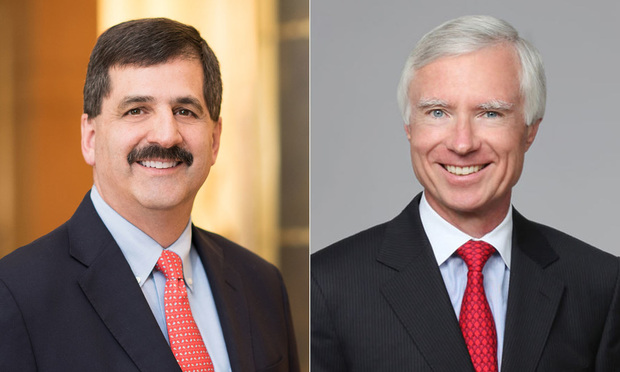Focus on CFIUS Pilot Program Doesn't Change Need for Traditional Risk Analysis: Experts
“Just because you don't have to submit a mandatory declaration doesn't mean you don't have CFIUS issues,” said Kenneth J. Nunnenkamp, an international trade and national security partner at Morgan Lewis' Washington, D.C., office.
February 11, 2019 at 07:24 PM
5 minute read
 (L to R) Kenneth Nunnenkamp of Morgan Lewis and Mark Herlach of Eversheds Sutherland. (Courtesy Photo)
(L to R) Kenneth Nunnenkamp of Morgan Lewis and Mark Herlach of Eversheds Sutherland. (Courtesy Photo)
Now that the Committee on Foreign Investment in the United States has expanded the scope of transactions subject to mandatory declaration, some companies and their attorneys may believe that there's no need for a traditional analysis of the need for a voluntary CFIUS review.
But that would be a mistake, CFIUS lawyers said.
“Just because you don't have to submit a mandatory declaration doesn't mean you don't have CFIUS issues,” said Kenneth J. Nunnenkamp, an international trade and national security partner at Morgan, Lewis & Bockius' Washington, D.C., office.
The U.S. Department of the Treasury, which oversees the interagency committee, published interim rules in October under the Foreign Investment Risk Review Modernization Act enacted last August. The rules established a pilot program for implementing several FIRRMA provisions, effective Nov. 10, 2018.
Under the program, any U.S. business involved in “critical technologies related to specific industries” and accepting direct or indirect foreign investments, including non-controlling investments, must file a declaration providing detailed information about the transaction to the committee. The 27 specific industries include airplane and parts manufacturing, space vehicles, computers and computer storage, semiconductors, chemical manufacturing, telecommunications equipment, nuclear power generation, TV and radio broadcasting, nanotechnology and aluminum manufacturing, among others.
➤➤ Get more reporting on developments in compliance, enforcement and government affairs with Compliance Hot Spots. Sign up here.
Nunnenkamp wrote in his blog on the firm's website that the new rule “has had an unintended consequence of focusing transacting parties on the mandatory declaration requirements, at the expense of the traditional risk analysis needed to determine whether a voluntary notice should be submitted.”
He said in an interview, “parties that have to do a mandatory declaration analysis may breathe a sigh of relief when they conclude they are not required to submit a declaration, only to find out later that they missed an essential part of the analysis when CFIUS reaches out and asks for a voluntary filing.”
Before President Donald Trump signed FIRRMA into law last August, companies engaged in proposed transactions that might trigger national security concerns went through a process of analyzing whether or not to voluntarily submit a filing to CFIUS for review. Not filing ran the risk of having the committee make inquiries late in the deal, potentially delaying or even blocking it if the government felt the deal posed a national security or strategic risk. Blocked deals had happened rarely until recently. Deciding whether or not to seek a review was part of the strategic process engaged in by the parties to the transaction and their attorneys.
But now clients may be so focused on whether they are required to file under new regulation that they may overlook whether they still need to consider a voluntary filing, “because a lot of the things that CFIUS would review are not pilot program industries focusing on emerging technologies. They obviously still care about traditional [risk factors],” Nunnenkamp said.
Some traditional concerns included proximity to military installations, for example.
Mark Herlach, partner at Eversheds Sutherland whose practices focuses on energy, international trade and defense, said the pilot program “does not in any way eliminate the need to do the traditional analysis. That is not a substitute for the traditional analysis. It is an add-on.”
Additionally, certain types of transactions that may have received approval from CFIUS at one time might not today given the changing geopolitical climate, and that doesn't apply only to Chinese companies, Nunnenkamp said. In his blog, he said a three-pronged analysis is now required:
- Determine whether a mandatory filing is necessary under the pilot program.
- If a mandatory filing is required, determine whether it would be preferable to file a joint voluntary notice instead.
- Even if a mandatory declaration isn't required, determine whether a voluntary notice should nevertheless be submitted.
Herlach said, “Even if you are not covered by the pilot program provisions that require a mandatory declaration you still need to do the traditional analysis to see if it is appropriate to do the voluntary filing. And you are not off the hook simply because you are not within the pilot program.”
Read More:
Counsel Scramble to Prep for New CFIUS Foreign Investment Rules Taking Effect Next Month
Trump Signs CFIUS Reform Bill in Upstate NY: What Dealmakers Need to Know
This content has been archived. It is available through our partners, LexisNexis® and Bloomberg Law.
To view this content, please continue to their sites.
Not a Lexis Subscriber?
Subscribe Now
Not a Bloomberg Law Subscriber?
Subscribe Now
NOT FOR REPRINT
© 2025 ALM Global, LLC, All Rights Reserved. Request academic re-use from www.copyright.com. All other uses, submit a request to [email protected]. For more information visit Asset & Logo Licensing.
You Might Like
View All
Trump Taps McKinsey CLO Pierre Gentin for Commerce Department GC

GOP Now Holds FTC Gavel, but Dems Signal They'll Be a Rowdy Minority
6 minute read

Fired by Trump, EEOC's First Blind GC Lands at Nonprofit Targeting Abuses of Power
3 minute readTrending Stories
Who Got The Work
J. Brugh Lower of Gibbons has entered an appearance for industrial equipment supplier Devco Corporation in a pending trademark infringement lawsuit. The suit, accusing the defendant of selling knock-off Graco products, was filed Dec. 18 in New Jersey District Court by Rivkin Radler on behalf of Graco Inc. and Graco Minnesota. The case, assigned to U.S. District Judge Zahid N. Quraishi, is 3:24-cv-11294, Graco Inc. et al v. Devco Corporation.
Who Got The Work
Rebecca Maller-Stein and Kent A. Yalowitz of Arnold & Porter Kaye Scholer have entered their appearances for Hanaco Venture Capital and its executives, Lior Prosor and David Frankel, in a pending securities lawsuit. The action, filed on Dec. 24 in New York Southern District Court by Zell, Aron & Co. on behalf of Goldeneye Advisors, accuses the defendants of negligently and fraudulently managing the plaintiff's $1 million investment. The case, assigned to U.S. District Judge Vernon S. Broderick, is 1:24-cv-09918, Goldeneye Advisors, LLC v. Hanaco Venture Capital, Ltd. et al.
Who Got The Work
Attorneys from A&O Shearman has stepped in as defense counsel for Toronto-Dominion Bank and other defendants in a pending securities class action. The suit, filed Dec. 11 in New York Southern District Court by Bleichmar Fonti & Auld, accuses the defendants of concealing the bank's 'pervasive' deficiencies in regards to its compliance with the Bank Secrecy Act and the quality of its anti-money laundering controls. The case, assigned to U.S. District Judge Arun Subramanian, is 1:24-cv-09445, Gonzalez v. The Toronto-Dominion Bank et al.
Who Got The Work
Crown Castle International, a Pennsylvania company providing shared communications infrastructure, has turned to Luke D. Wolf of Gordon Rees Scully Mansukhani to fend off a pending breach-of-contract lawsuit. The court action, filed Nov. 25 in Michigan Eastern District Court by Hooper Hathaway PC on behalf of The Town Residences LLC, accuses Crown Castle of failing to transfer approximately $30,000 in utility payments from T-Mobile in breach of a roof-top lease and assignment agreement. The case, assigned to U.S. District Judge Susan K. Declercq, is 2:24-cv-13131, The Town Residences LLC v. T-Mobile US, Inc. et al.
Who Got The Work
Wilfred P. Coronato and Daniel M. Schwartz of McCarter & English have stepped in as defense counsel to Electrolux Home Products Inc. in a pending product liability lawsuit. The court action, filed Nov. 26 in New York Eastern District Court by Poulos Lopiccolo PC and Nagel Rice LLP on behalf of David Stern, alleges that the defendant's refrigerators’ drawers and shelving repeatedly break and fall apart within months after purchase. The case, assigned to U.S. District Judge Joan M. Azrack, is 2:24-cv-08204, Stern v. Electrolux Home Products, Inc.
Featured Firms
Law Offices of Gary Martin Hays & Associates, P.C.
(470) 294-1674
Law Offices of Mark E. Salomone
(857) 444-6468
Smith & Hassler
(713) 739-1250






